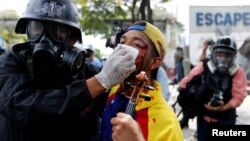Venezuela's opposition announced a two-day national strike this week aimed at pressuring President Nicolas Maduro to cancel a controversial July 30 election for a new congress.
"We are calling out the entire people, all groups in society, for a 48-hour strike" on Wednesday and Thursday, lawmaker Simon Calzadilla said.
Calzadilla said a protest march on Friday, following the strike, will demand that Maduro officially scrap the vote,
The president, however, remains defiant in the face of ever-increasing protests and international pressure.
"The imperial right wing believes it can give orders to Venezuela," Maduro said, referring to U.S. President Donald Trump's threat to impose economic sanctions on Caracas unless the vote is aborted.
"The only ones who give orders here are the people," Madura said during his weekend television commentary, broadcast late Saturday. "This time next week (on Sunday) Venezuelans will be voting for a Constituent Assembly."
Protesters in Caracas marched toward the embattled nation's supreme court Saturday, chanting slogans denouncing Maduro's plan to rewrite the constitution. National Guard troops used tear gas in at least one location, blocking protesters with clouds of white gas and rows of officers on motorcycles.
A 23-year-old violinist who has become a symbol of anti-government protests in Venezuela, Wuilly Arteaga, was hit in the face and injured during clashes between protesters and security forces.
Speaking from a hospital in Caracas, Arteaga said, "No matter what, we will continue to fight." He gained fame for playing his instrument in the middle of ongoing violent clashes in the Venezuelan capital.
Violence during four months of anti-government unrest has taken more than 100 lives, injured thousands, left hundreds in jail and further damaged an economy in its fourth year of a debilitating decline.





